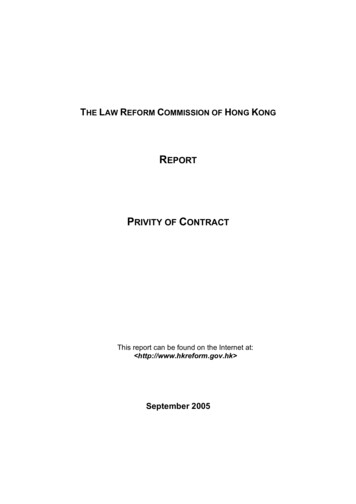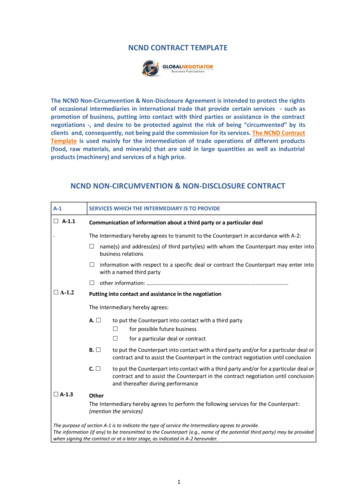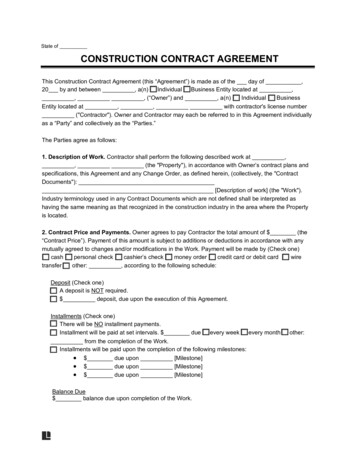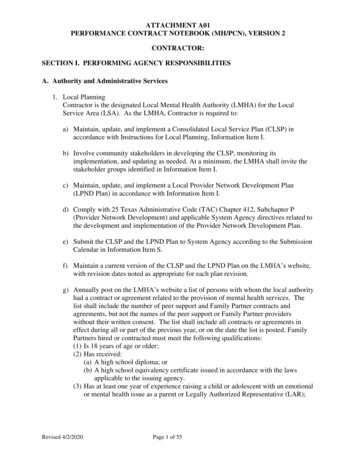
Transcription
THE LAW REFORM COMMISSION OF HONG KONGREPORTPRIVITY OF CONTRACTThis report can be found on the Internet at: http://www.hkreform.gov.hk September 2005
The Law Reform Commission of Hong Kong was established by the ExecutiveCouncil in January 1980. The Commission considers for reform suchaspects of the law as may be referred to it by the Secretary for Justice or theChief Justice.The members of the Commission at present are:The Hon Ms Elsie Leung Oi-Sie, GBM, JP,Secretary for Justice (Chairman)The Hon Mr Justice Andrew Li, Chief JusticeMr Tony Yen, SBS, JP, Law DraftsmanDr John Bacon-ShoneThe Hon Mr Justice Bokhary, PJProfessor Albert Chen, JPMr Anthony Chow, SBS, JPProfessor Y K Fan, BBS, JPMr Alan Hoo, SBS, SC, JPThe Hon Mrs Sophie Leung, SBS, JPProfessor Michael McConvilleMr Benjamin Yu, SC, JPThe Secretary of the Commission is Mr Stuart M I Stoker and its offices areat:20/F Harcourt House39 Gloucester RoadWanchaiHong KongTelephone:Fax:E-mail:Website:2528 04722865 2902hklrc@hkreform.gov.hk http://www.hkreform.gov.hk
THE LAW REFORM COMMISSIONOF HONG KONGREPORTPRIVITY OF CONTRACTCONTENTSChapterPagePreface1Terms of referenceThe Sub-committeeMeetingsWhat is “privity of contract”?Criticisms of the privity doctrine and reform in other jurisdictionsThe consultation processLayout of this report11222331.5The current law in Hong KongThe doctrine of privity(i)Contracts to pay money to a third party(ii)Contracts to purchase real property(iii)Insurance contractsLegal principles which have the effect of allowing third parties to enforcerightsCommon lawStatutory provisionsHow the Hong Kong courts have received judicial developments in othercommon law jurisdictionsCanadaAustraliaHong Kong courts2.Should the privity doctrine be reformed?Arguments against reforming the privity doctrinei5667789111112131515
ChapterPage1516161717Third party should not be able to sue in the absence of considerationContracts are personal transactionsUndesirable to subject promisor to two actionsUnjust that the third party can sue on the contract but cannot be suedLimits freedom of the contracting parties to rescind or vary andexposes them to a wide range of possible third party plaintiffsArguments for reforming the privity doctrineFrustrating parties' intention to benefit third partiesThe privity doctrine is unduly complex, uncertain and artificialThe person who has suffered the loss cannot sue, while the personwho has suffered no loss can sueThe injustice to a third party who has relied on the promiseWidespread and continuous criticism of the doctrine, and abrogation ofthe doctrine in other jurisdictionsConclusion223.26Options for reform of the privity doctrineOption 1 – Judicial development of circumvention of the privity doctrineOption 2 – Legislative exceptions to the privity doctrine to be made inspecific instancesOption 3 – Adopting a general provision that no third party should bedenied enforcement of a contract made for his benefit on thegrounds of lack of privityOption 4 – Reform by means of a detailed legislative schemeConclusion4.The elements of the new legislative schemeWho is a third party?AustraliaCanadaEngland and WalesNew ZealandSingaporeOptions and conclusionsWhat is the test of enforceability?AustraliaCanadaEngland and WalesNew ZealandSingaporeOptions and conclusionCan the contracting parties vary or rescind the contract?AustraliaEngland and 940414343535354
ChapterPage55555660New ZealandSingaporeOptions and conclusionsCan the parties vary or rescind the contract after crystallisation, or laydown their own crystallisation test?CanadaEngland and WalesNew ZealandSingaporeOptions and conclusionsShould there be any judicial discretion to authorise variation orcancellation?England and WalesNew ZealandSingaporeOptions and conclusionsShould consideration be an issue?AustraliaEngland and WalesNew ZealandSingaporeOptions and conclusionWhat defences, set-offs and counterclaims should be available topromisors?AustraliaCanadaEngland and WalesNew ZealandSingaporeOptions and conclusionHow should overlapping claims against promisors be dealt with?Promisor's duty owed both to the promisee and the third partyDischarge of promisor by performing obligation to the third partyAvoidance of double liabilityShould arbitration clauses and exclusive jurisdiction clauses be binding onthird parties?England and WalesSingaporeOptions and conclusionsWhat should the scope of the present reform be?Preservation of existing rights of third partiesAreas to which the recommended legislation should not applyMiscellaneous issues8687879393971075.110Summary of 727272727374747878828386
ChapterPageAnnex 1114List of those who responded to the consultation paperAnnex 2115Comparison table of the rules on reforming the privity doctrineAnnex 3124Legislation in other jurisdictionsiv
PrefaceTerms of reference1.In December 2002, the Secretary for Justice and the ChiefJustice directed the Law Reform Commission:"To examine the doctrine of privity of contract and its exceptions,and the justifications for and against its retention, and to makesuch recommendations for reform as appropriate."The Sub-committee2.In the same month, the Law Reform Commission appointed asub-committee under the chairmanship of Mr Benjamin Yu, SC, to considerthe subject and to make proposals to the Commission for reform. Themembers of the Sub-committee reflected a range of backgrounds andexpertise. All were appointed in their personal capacity, rather than formallyrepresenting the particular organisations to which they belong.Themembership of the Sub-committee was:Mr Benjamin Yu, SC, JP(Chairman)Senior CounselMr Anthony Chow, SBS, JPPartnerPeter C Wong, Chow & ChowMr Simon ChuiLegal CounselConsumer CouncilMr Baptista LaiBarrister-at-LawMr Christopher PottsPartnerCrump & CoThe Hon Mr Justice ReyesJudgeCourt of First InstanceMr Peter SchellingManaging Director & CEOZurich Insurance Group (HK)Ms Isabelle TsangLegal CounselBank of China (HK) Ltd1
Ms Jessica YoungAssistant ProfessorDepartment of Professional Legal EducationFaculty of LawThe University of Hong KongMr Byron LeungSecretaryMeetings3.The Sub-committee began its work on 29 January 2003 andbetween then and the publication of this report held a total of nineteenmeetings.What is "privity of contract"?4.The doctrine of privity of contract ("the doctrine of privity") holdsthat a contract cannot confer rights or impose obligations on any personsother than the parties to the contract. The doctrine of privity is also known asthe "third party rule". The doctrine has two aspects: as a general rule,(a)a person cannot acquire and enforce rights under a contract towhich he is not a party; and(b)a person who is not party to a contract cannot be made liableunder it.The second aspect is generally regarded as just and sensible. However, thefirst aspect, that a third party cannot acquire rights under a contract to whichhe is not privy, has been criticised. The main concern of this report istherefore with this first aspect of the rule, and references to the doctrine ofprivity or the "third party rule" are to this.Criticisms of the privity doctrine and reform in otherjurisdictions5.The privity doctrine has long been criticised as artificial andcontrary to the parties' intention to benefit a third party. As a result, the courtshave sometimes needed recourse to devices such as agency and trust toallow a third party to enforce a right conferred on him. Furthermore,legislation has made incremental inroads to the doctrine in specific cases.These legal principles at common law and in statutes circumvent the privitydoctrine in some cases, but not generally.1 It is no surprise that law reformbodies in various common law jurisdictions have critically examined the1These legal principles are discussed in Chapter 1.2
doctrine and recommended its reform.2 In Australia (Western Australia andQueensland), Canada (New Brunswick), England, New Zealand andSingapore the privity doctrine has eventually been abrogated by legislation.36.The questions which fall to be considered are whether theanomalies of the privity doctrine are serious enough to warrant its reform and,if so, whether ad hoc reforms, either by the courts on their own initiative or bylegislation, are adequate in the modern Hong Kong context, or whether anissue of this magnitude calls for comprehensive legislative reform.The consultation process7.The Sub-committee published a consultation paper on Privity ofContract (the "consultation paper") in June 2004, with a consultation perioduntil the end of August 2004. The Sub-committee received responses to theconsultation paper from those listed at Annex 1. We are grateful to all thosewho responded to the consultation paper.8.The recommendations in the consultation paper were in generalsupported by the majority of respondents. Nevertheless, some respondentsdid have specific comments and reservations on both the recommendationsand the issues discussed in the consultation paper. Apart from writtencomments, the Hong Kong Construction Association Ltd also met the Subcommittee and presented the consolidated views of the Association itself, theHong Kong Federation of Electrical & Mechanical Contractors, the Hong KongInstitute of Surveyors, the Hong Kong Institute of Architects and theAssociation of Consulting Engineers.We will deal with the variouscomments and reservations in the following chapters.Layout of this report9.This report is the result of careful consideration of the initialrecommendations in the consultation paper in the light of the responses wereceived. Chapter 1 of this report further examines the doctrine of privity aswell as the common law and statutory principles which have the effect ofcircumventing the doctrine. Chapter 2 discusses the arguments for andagainst reforming the doctrine, while Chapter 3 examines a number of options23Such as the Queensland Law Reform Commission, Report on a Bill to Consolidate, Amend andReform the Law Relating to Conveyancing, Property, and Contract and to Terminate theApplication of Certain Imperial Statutes (1973); the Law Commission (England), Privity ofContracts: Contracts for the Benefit of Third Parties (1996); the New Zealand Contracts andCommercial Law Committee, Report on Privity of Contract (1981); and Law and RevisionDivision, Attorney General Chambers (Singapore), Report on the Proposed Contracts (Rightsof Third Parties) Bill 2001: Law Reform Commission of Nova Scotia, Report on Pivity ofContract (Third Party Rights) (2004).See the Western Australian Property Law Act 1969 (Western Australia), the QueenslandProperty Law Act 1974 (Queensland), the Law of Property Act 2000 (the Northern Territory),the Law Reform Act 1993 (New Brunswick), the Contracts (Rights of Third Parties) Act 1999(England), the Contracts (Privity) Act 1982 (New Zealand), and the Contracts (Right of ThirdParties) Act 2001 (Singapore).3
for reform and concludes in favour of recommending reform by means of adetailed legislative scheme. Chapter 4 examines the legislative schemes inother major common law jurisdictions and considers various options beforemaking our provisional recommendations for a legislative scheme for HongKong. Chapter 5 summarises all our recommendations.4
Chapter 1The current law in Hong KongThe doctrine of privity1.1In this chapter, we further explain the doctrine of privity andillustrate its effect with some real-life examples. We then examine commonlaw and statutory principles which have the effect of circumventing thedoctrine and allowing a third party to enforce a jus quaesitum (a rightconferred on him by the contractual parties). The last part of the chapterlooks at judicial developments in other common law jurisdictions anddiscusses how those developments have been received by the Hong Kongcourts.1.2As explained in the Preface, the doctrine of privity has twoaspects. The first aspect, which is the crux of our present discussion, is that,as a general rule, a person cannot acquire and enforce rights under a contractto which he is not a party. The doctrine of privity at common law is generallyconsidered to have been established in Tweddle v Atkinson.1 The court inthat case held that, in the words of Wightman J, "no stranger to theconsideration could take advantage of a contract though made for hisbenefit." 2 That is to say, a third party to a contract, not having providedconsideration himself, cannot enforce the contract even if it has been enteredinto for his benefit. The rule was affirmed in Dunlop Pneumatic Tyre Co Ltd vSelfridge & Co Ltd 3 when the House of Lords accepted that it was afundamental principle of law that only a party to a contract who had providedconsideration could sue on it.4 This "consideration" rule is related to thedoctrine of privity and is regarded as a possible explanation for the doctrine.51.3When considering the effect of the privity doctrine, accountneeds to be taken of the remedy rule: the need to prove loss in an action forbreach of contract. When a plaintiff sues for breach of contract, he mustprove that he has suffered actual loss as a result of the alleged breach.12345(1861) 1 B & S 393. Kepong Prospecting Ltd v Schmidt [1968] AC 810, a decision of the PrivyCouncil on appeal from Malaysia, seems to support the view that the doctrine of privity isdistinct from the rule that consideration must move from the promisee. G Treitel, The Law ofContract, Sweet and Maxwell, 11th Edition, 2003, at 587.(1861) 1 B & S 393, at 397.[1915] AC 847.The existence of the doctrine of privity was, however, later doubted by Denning LJ in Smith andSnipes Hall Farm Ltd v River Douglas Catchment Board [1949] 2 KB 500 in 1949 and DriveYourself Hire Co (London) Ltd v Strutt [1954] 1 QB 250 in 1954. See also G Treitel, The Lawof Contract (cited above), at 588. However, the House of Lords (with Lord Denning dissenting)once again affirmed the existence of the doctrine of privity in 1961 in Sruttons Ltd v MidlandSilicones Ltd [1962] AC 446.G Treitel, The Law of Contract (cited above), at pages 588. Chapter 2 will discuss whetherthe rationale is valid, and will also critically discuss other possible reasons for supporting theprivity doctrine.5
Otherwise, he will only be entitled to nominal damages. This, whencombined with the privity doctrine, could lead to unjust results in somecircumstances. For example, suppose a contract is entered into between aparent company and a contractor for the benefit of a subsidiary company. Ifthe subsidiary company subsequently suffers loss as a result of thecontractor's breach, the subsidiary company cannot sue the contractorbecause it is not a party to the contract. The parent company, even though itis a party to the contract, will only recover nominal damages because it hassuffered no actual loss. Hence it is not a viable option for a promisee (theparent company) to sue the promisor (the contractor). The decision of AlfredMcAlpine Construction Ltd v Panatown6 is a good example of the rule that aperson can only recover nominal damages unless he has suffered actual loss.1.4The effect of the first aspect of the doctrine of privity oneveryday life can best be illustrated by some real-life examples.(i)Contracts to pay money to a third party1.5A and B enter into an agreement under which A agrees to pay asum of money to C. Both parties fully intend that C should take the benefit ofA's promise. If A defaults, C cannot sue A because of the doctrine of privity.It does not help for B to sue A for damages since B would be unlikely to havesuffered any damage himself. Sometimes, the Court may be able to preventan injustice to C if B is prepared to sue A for specific performance and theCourt is prepared to make an order compelling A to perform his promise.(ii)Contracts to purchase real property1.6A property developer enters into a building contract with acontractor under which the contractor promises to use good workmanship andsound materials. The contractor warrants that he would make good anydefects in the building within a stated period of, say, twelve months. Shortlybefore completion of the building, the developer sells individual units topurchasers. If a purchaser of a unit discovers a defect in his flat, he has nodirect recourse against the building contractor. This is still the case eventhough the developer may have obtained the building contractor's warrantiesspecifically for the benefit of purchasers, since purchasers are not "privy" tothe building contract. In practice, a developer may withhold part of thepayment to the building contractor to ensure that the building contractorhonours its promise. The developer may also contract with the purchaserthat the developer would exercise its best endeavours to enforce all defectsand maintenance obligations under all contracts relating to the construction ofthe development.7 Nevertheless, a purchaser may find himself in a poor67[2001] 1 AC 518.R5C(2)-(5) of the Solicitors’ Practice Rules (Cap 159); Circular No 04-53 (PA) of the LawSociety of Hong Kong and Circular Memorandum No.40A of the Legal Advisory andConveyancing Office ml (last visit on 27June 2005).6
bargaining position because his only direct recourse, if any, is against thedeveloper. Even that would depend upon the terms of his contract with thedeveloper and on whether the developer is still around to honour its promise.In certain circumstances 8 , the contract between a developer and thepurchasers may provide that where the developer is wound up, all warrantiesand guarantees under all contracts relating to the construction of thedevelopment would be assigned by the developer to the owners' corporationincorporated under the Building Management Ordinance (Cap 344) or, if nosuch corporation exists, to the manager of the development for the time beingto be held in trust for purchasers of the units in the development. Thisrecourse against the contractor is indirect, however, and an individualpurchaser may encounter difficulties in compelling the owners’ corporation orthe manager of the development to sue the contractor.(iii)Insurance contracts1.7B is a sub-contractor of A. B takes out an insurance policy tocover his and A's liability to employees' compensation with an insurer (C),without joining A as a party. An employee of B is injured in the course ofemployment because of the negligence of A's employee. A pays therequired compensation to B's employee. A, however, will have difficulties inseeking indemnity from C, since A is not a party to the insurance contracteven though the parties intend to benefit him.Legal principles which have the effect of allowing third partiesto enforce rights1.8As illustrated in the above examples, strict adherence to theprivity doctrine can prove artificial and contrary to the parties' intention, andcan lead to injustice and inconvenience. There are, however, circumstancesin which the doctrine does not apply, either because of supervening principlesof common law or because of specific statutory provisions which allow a thirdparty to enforce a right conferred on him by the contracting parties. Thefollowing paragraphs will first explain the principles at common law, followedby those in statutes. The merits and limits of employing these common lawand statutory principles as options for reforming the privity doctrine arediscussed under "Option 1" and "Option 2" respectively in Chapter 3 whereother possible options for reform are also considered.8R5C(2)-(5) of the Solicitors’ Practice Rules (Cap 159); Circular no 04-53 (PA) of the LawSociety of Hong Kong and Circular Memorandum No.40A of the Legal Advisory andConveyancing Office ml (last visit on 27June 2005).7
Common law(i)Covenants concerning land1.9Covenants in a lease can benefit t
Division, Attorney General Chambers (Singapore), Report on the Proposed Contracts (Rights of Third Parties) Bill 2001: Law Reform Commission of Nova Scotia, Report on Pivity of Contract (Third Party Rights) (2004). 3 See the Western Australian











